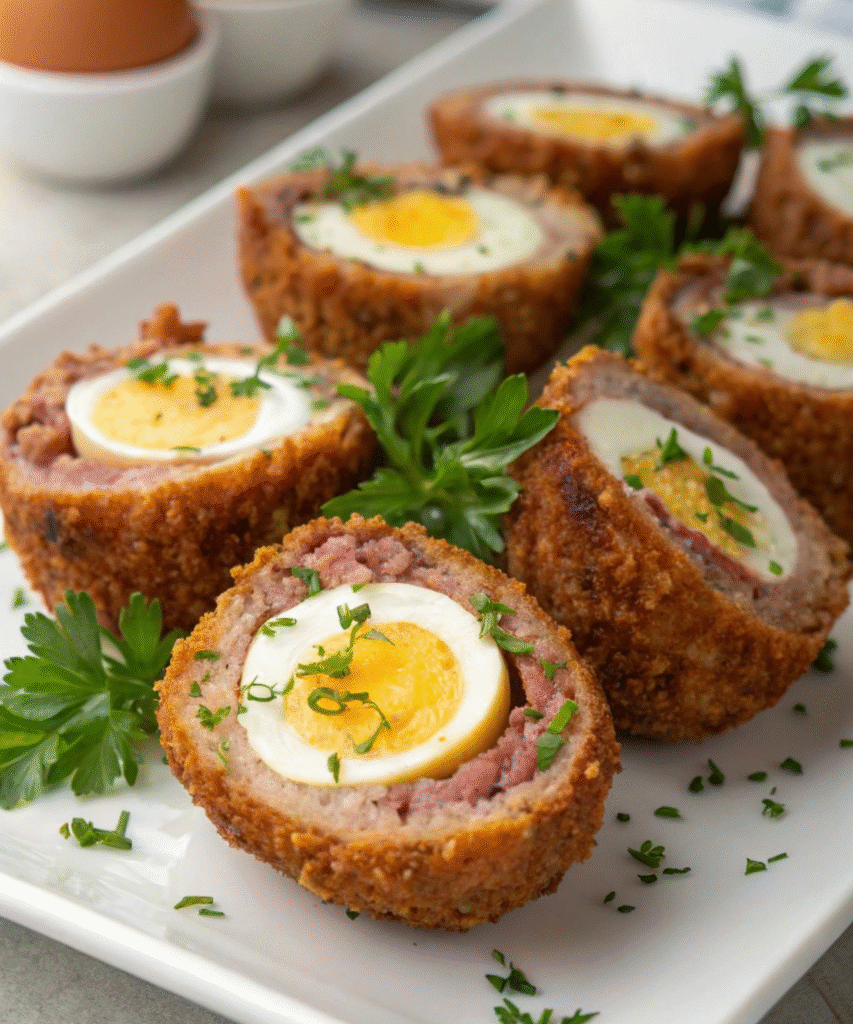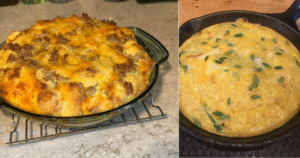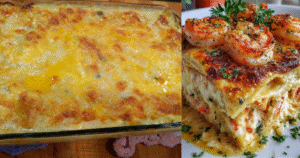These crispy, golden scotch eggs transform simple hard-boiled eggs into an irresistible pub-style treat that’s perfect for breakfast, lunch, or dinner. Each egg is wrapped in seasoned sausage meat, coated in breadcrumbs, and deep-fried to perfection, creating a satisfying contrast between the crunchy exterior and creamy yolk center. While the technique requires some finesse, the results are well worth the effort for this classic British comfort food.
Recipe Details
Prep Time: 30 mins
Cook Time: 15 mins
Total Time: 45 mins
Servings: 6
Difficulty: Medium
Ingredients
For the Scotch Eggs:
- 6 large eggs (for boiling)
- 1 pound ground pork sausage (preferably with herbs and spices)
- 2 tablespoons fresh sage, finely chopped
- 1 teaspoon dried thyme
- ½ teaspoon garlic powder
- ½ teaspoon black pepper
- ¼ teaspoon cayenne pepper (optional)
- 1 teaspoon salt
For the Coating:
- 3 large eggs, beaten
- 1 cup all-purpose flour
- 2 cups panko breadcrumbs
- 1 cup fine dry breadcrumbs
- ½ teaspoon paprika
- ¼ teaspoon salt
For Frying:
- Vegetable oil for deep frying (about 6-8 cups)
- Fresh parsley for garnish

Instructions
Prepare the Hard-Boiled Eggs
- Place 6 eggs in a large saucepan and cover with cold water by 1 inch. Bring water to a rolling boil over high heat, then immediately remove from heat and cover the pan.
- Let eggs sit in hot water for exactly 9 minutes for slightly soft centers, or 11 minutes for fully set yolks. Immediately transfer eggs to an ice water bath to stop cooking.
- Once completely cooled, gently tap eggs all over and peel under cool running water. Pat eggs completely dry with paper towels and set aside.
Prepare the Sausage Mixture
- In a large bowl, combine ground sausage, chopped sage, thyme, garlic powder, black pepper, cayenne, and salt. Mix thoroughly with clean hands until seasonings are evenly distributed throughout the meat.
- Divide sausage mixture into 6 equal portions, about 2½ ounces each. Roll each portion into a ball, then flatten into a thin oval patty large enough to wrap around an egg.
Wrap the Eggs
- Place one peeled egg in the center of a sausage patty. Gently wrap the sausage around the egg, pressing seams together and ensuring the meat covers the egg completely with no gaps. Roll gently between your palms to create a smooth, even coating.
- Repeat with remaining eggs and sausage. The wrapped eggs should look like large, uniform ovals. Refrigerate wrapped eggs for 15 minutes to help the sausage adhere.
Set Up Breading Station
- Arrange three shallow dishes: flour mixed with ¼ teaspoon salt in the first, beaten eggs in the second, and combined panko and fine breadcrumbs with paprika and remaining salt in the third.
- Working with one scotch egg at a time, roll first in seasoned flour, shaking off excess. Dip into beaten egg, allowing excess to drip off. Finally, roll in breadcrumb mixture, pressing gently to ensure coating adheres completely.
Heat the Oil
- Pour oil into a heavy-bottomed pot or deep fryer to a depth of at least 4 inches. Heat oil to exactly 350°F, using a candy thermometer to monitor temperature. Oil temperature is crucial for proper cooking.
- Line a large plate with paper towels and have a slotted spoon ready for transferring cooked eggs.
Fry the Scotch Eggs
- Carefully lower 2-3 scotch eggs into hot oil using a slotted spoon, being careful not to overcrowd. Fry for 4-5 minutes, turning occasionally with a spoon to ensure even browning on all sides.
- The coating should be deep golden brown and crispy. Remove with slotted spoon and drain on paper towels. Check oil temperature and adjust heat as needed before frying remaining batch.
- Let scotch eggs rest for 3-4 minutes before serving to allow the interior temperature to settle and prevent burns from hot yolk.
Tips for Success
Perfect Egg Timing: The key to great scotch eggs is controlling the yolk consistency. For runny centers, boil for exactly 6-7 minutes. For jammy yolks, stick to 9 minutes. Fully set yolks need 11-12 minutes.
Sausage Selection: Choose high-quality pork sausage with good fat content (about 20-25%). Italian sausage, breakfast sausage, or specialty herb sausages all work beautifully.
Even Wrapping: Keep your hands slightly damp when wrapping eggs to prevent sticking. The sausage layer should be about ¼-inch thick all around for even cooking.
Oil Temperature Control: Maintain oil at 350°F throughout frying. Too hot and the outside burns before the sausage cooks; too cool and the coating becomes greasy.
Make-Ahead Option: Wrap and bread scotch eggs up to 24 hours ahead. Store covered in refrigerator and bring to room temperature 15 minutes before frying.
Recipe Variations
Herb-Crusted Version: Add 2 tablespoons chopped fresh herbs (parsley, chives, dill) to the breadcrumb mixture for extra flavor and color.
Spicy Scotch Eggs: Use spicy Italian sausage and add 1 teaspoon hot sauce to the beaten eggs for coating. Increase cayenne pepper to ½ teaspoon.
Baked Alternative: For a lighter version, brush coated scotch eggs with melted butter and bake at 400°F for 20-25 minutes, turning once halfway through.
Black Pudding Twist: Replace half the sausage with crumbled black pudding for an authentic British pub variation.
Vegetarian Option: Use plant-based sausage or a mixture of seasoned mushrooms, nuts, and breadcrumbs for the coating.
Storage Instructions
Freshly made scotch eggs are best served immediately while the coating is crispy and the interior is warm. However, they can be stored in the refrigerator for up to 3 days in airtight containers.
To reheat, place scotch eggs on a baking sheet and warm in a 350°F oven for 8-10 minutes until heated through. Avoid microwaving as this makes the coating soggy.
Uncooked, breaded scotch eggs can be frozen for up to 1 month. Freeze on a baking sheet until solid, then transfer to freezer bags. Fry directly from frozen, adding 1-2 extra minutes to cooking time.
Nutritional Highlights
Each scotch egg provides approximately 380-420 calories with substantial protein from both the egg and sausage. The combination offers complete amino acids, B vitamins, and essential minerals. While indulgent, scotch eggs can be part of a balanced diet when enjoyed in moderation.
The eggs provide choline for brain health, while the sausage contributes iron and zinc. Using panko breadcrumbs creates a lighter coating than traditional breadcrumbs.
Serving and Pairing Suggestions
Serve scotch eggs warm as a main dish with English mustard, brown sauce, or homemade aioli for dipping. They pair beautifully with a simple green salad, roasted vegetables, or traditional British chips.
For breakfast or brunch, serve alongside grilled tomatoes, baked beans, and toast soldiers. As pub food, they’re perfect with a pint of bitter or a crisp lager.
Cut scotch eggs in half just before serving to showcase the perfectly cooked yolk and create an impressive presentation. The contrast between the golden exterior and creamy center makes for an Instagram-worthy dish.
These homemade scotch eggs elevate a simple concept into restaurant-quality comfort food that’s perfect for impressing guests or treating yourself to something special. The technique may take practice, but once mastered, you’ll have a versatile recipe that works for any meal of the day.



